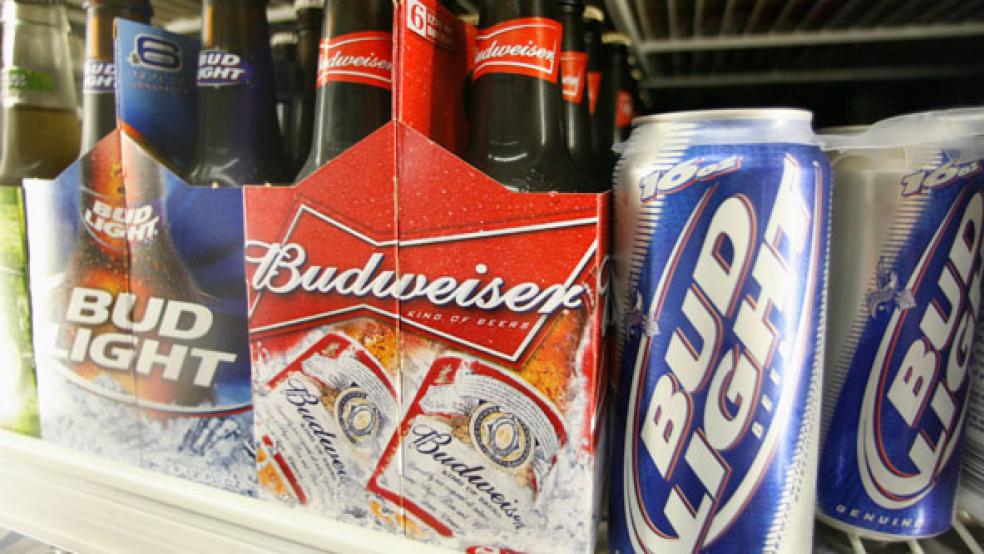On Sunday, when you settle in to watch the Super Bowl and maybe pop the top on a beer or six, you’ll witness an impressive display of dominance. It might not come from San Francisco 49ers quarterback phenom Colin Kaepernick, or from retiring Baltimore Ravens linebacker Ray Lewis – or from either of the teams on the field, for that matter. Just watch the ads and you’ll see Anheuser-Busch InBev, the beer giant, roll over other advertisers with the confidence and head of steam of a winner.
Anheuser-Busch is the exclusive beer advertiser on the Super Bowl broadcast, having bought 4.5 minutes of commercial time to promote Bud and Bud Light as well as it newest brands, Budweiser Black Crown and Beck’s Sapphire. And just in case the beer and football connection wasn’t clear enough from that, the 49ers, coincidentally, just this week announced a 10-year deal to make Bud Light the "official and exclusive malt beverage partner" when it opens its new $1.2 billion stadium in Santa Clara next year.
Super Bowl airtime is one thing, but Anheuser-Busch InBev (ABI) clearly rules the U.S beer market. It owns and operates 125 breweries around the world – including 12 in the U.S. – and more than 200 brands, from Bud and Bud Light to Busch, Michelob, Stella Artois, Goose Island and Beck’s. ABI controls 39 percent of U.S. beer sales by dollars, according to the government, and 46.3 percent of beer market shipments, according to Beer Marketer’s Insights.The next largest beer-maker, MillerCoors, has about 26 percent of the market.
With such sway over the market already, the Justice Department on Thursday filed a civil antitrust suit to block Anheuser-Busch InBev from buying the 50 percent of Mexico’s Grupo Modelo that it doesn’t already own. Modelo, best known for its Corona brand, is the third-largest beer company in the country. Their planned $20.1 billion deal is the biggest to face opposition from the Justice Department since 2011, when the government sued to stop AT&T’s $39 billion buyout of T-Mobile.
In this case, the government said it was trying to make sure that the beer company couldn’t run up the score on Joe Sixpack. The government said the beer deal would substantially reduce competition in the U.S. market overall and in 26 metropolitan areas in particular, “resulting in consumers paying more for beer and having fewer new products from which to choose.” It noted that American’s spent at least $80 billion on beer last year, with Bud Light reigning as the best-selling brew and Corona Extra the top-selling import.
Leaving aside what those facts say about Americans’ taste in beer – Bud Light, people? Really? – the DOJ said that it brought the suit to prevent ABI from gaining more pricing power, since “even a small increase in the price of beer could result in billions of dollars of harm to American consumers.”
If the government fears ABI will have one too many, the brewer seems to think regulators are drunk with power. In a statement, Anheuser-Busch InBev said the government’s action “is inconsistent with the law, the facts and the reality of the market place.” The company vowed to contest the suit.
The government complaint broke down how pricing works in the beer market. The two biggest players, ABI and MillerCoors, represent a combined 65 percent of sales – and the government said that figure actually understates the impact that eliminating Modelo as a competitor would have on the market. “As the two largest brewers, ABI and MillerCoors often find it more profitable to follow each other’s prices than to compete aggressively for market share by cutting price,” the lawsuit says. “Among other things, ABI typically initiates annual price increases in various markets with the expectation that MillerCoors’ prices will follow. And they frequently do.”
A December 2012 report from the New America Foundation criticized the continued consolidation of the beer industry and noted the lack of price competition among the two giants. “Immediately after the Brazilian-Belgian company Inbev purchased Anheuser-Busch in 2008, a years-long price war between A-B and MillerCoors came to a sudden end, and the two giants soon began to raise their prices in concert,” it said.
Modelo, on the other hand, has resisted following ABI’s lead on pricing. The 27-page government complaint quotes several internal ABI strategy documents in which executives cite price pressure from Modelo, even saying that Corona was “eating [Budweiser’s] lunch” in California. “Because Modelo prices have not closely followed ABI’s price increases, ABI and MillerCoors have been forced to offer lower prices and discounts for their brands,” the lawsuit says. “If ABI were to acquire the remainder of Modelo, this competitive constraint on ABI’s and MillerCoors’ ability to raise their prices would be eliminated.” The pricing strategy has worked for Modelo. Its share of beer sales has edged up from 5.1 percent in 2009 to 5.7 percent in 2012, while the top two companies have seen their share dip.
As Tim Hogan points out at the St. Louis Post-Dispatch, the whole battle is about what, from a consumer point of view, works out to 25 or 50 cents a sixpack. So as you crack open your beer during the big game, remember that the Justice Department insists this Bud lawsuit’s for you.





